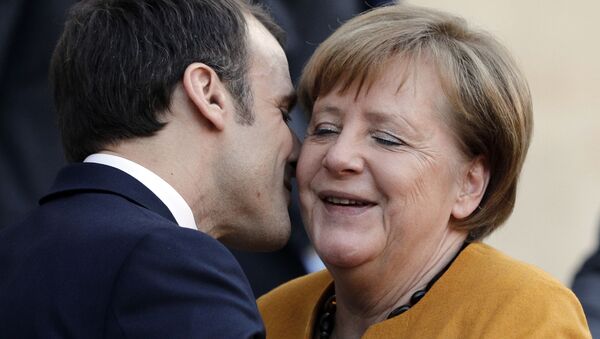On Monday, French President Emmanuel Macron and German Chancellor Angela Merkel unveiled a joint plan to boost EU recovery from the coronavirus crisis after weeks of discussions on how to deploy the billions of euros needed to end the economic shock and recession.
The plan promoted by France and Germany calls for the creation of a €500 billion recovery fund able to offer grants to the worst-affected countries and regions.
IFO Institute President (Leibniz Institute for Economic Research at the University of Munich) Clemens Fuest has supported the German-French initiative to help the EU and offered his views on the matter during an online press conference with the Association of Foreign Press in Germany (VAP).
Sputnik: What do you think of Macron and Merkel’s new plan to restore the EU through the European Commission? We can already see resistance to these plans. Austria, the Netherlands, Denmark and Sweden insist that the EU only issue repayable loans, not subsidies. How can you explain the changed position on the part of the federal government? The federal government also spoke out against the so-called corona bonds.
Mr Fuest: What has been agreed here doesn’t really concern corona bonds. Corona bonds were not a clear, clearly defined concept, while what has been proposed is a clear, feasible concept. I very much welcome it. I think it’s important that Germany and France have come forward with a common initiative, the two states that quite often have different positions regarding EU finances, the two states that are very important to promote issues. Of course, other countries are also important and should be involved in this matter.
If we compare this with corona bonds, the corona bonds initiative, in my view, was a domestic policy initiative of the countries that presented this plan. They publicly demanded something from other states, knowing that they would refuse. It originally was something non-working. And such a policy, in my opinion, is taking place in Europe for domestic political reasons and is not constructive at the European level.
I think that this initiative is constructive. A model has been agreed that can be implemented. The huge challenge that we are facing regarding this fund is to show that the costs that are coming up here have added value due to distribution at the European level.
This means that it’s necessary to show that if the EU spends this money, it will be more beneficial than if member states lend money and spend it themselves. They could do that too. Member states must guarantee these debts. And the EU has virtually no income of its own.
Therefore, it’s all based on member states guarantees. And it must be shown that this European fund, the money that is given out, is more useful, that this money is used on things that national expenses cannot provide.
There is considerable potential for the aforementioned European added value. For example, the added value may consist in the fact that all this will become insurance. That money will go to countries that have been hit hardest by the crisis. We have some ideas in this regard. But we still don’t know exactly how much states will be affected.
According to the IMF forecast, Germany has a negative growth of seven percent, and France has a negative growth of eight percent. In Italy, negative growth is nine percent. According to the IMF forecast, this means that these three states have been affected to a similar extent. We don’t know whether things will get to this; it’s still unclear who will get this insurance money and who will pay it.
If the whole thing is organized in such a way that those who are hardest hit, but who can insure themselves against this crisis, get something, it is creating added value. A nation-state cannot insure itself.
But it wouldn’t help if all member states were hit equally. An insurance community where everyone suffers the same doesn’t help. However, added value will appear if the crisis is asymmetrical.
In the end, solidarity is also added value. This means that there is interest on the part of all European states that no country will collapse economically or destabilize. And that could also be European value-added. But, nevertheless, it won’t be easy to try to really spend money better than national money. This will need to be well demonstrated. If it works, this is very good.
I think the initiative for this fund at the European level is so important because it is a political signal that the EU is alive, that the EU is acting in a crisis like this. That is a very important signal. A signal that the EU will still be there after the crisis is a signal to everyone. It’s vital for the EU that certain actions are being taken here and that we can count on success.
On Political Debate
I expect political debate in parliament, as well as in other European countries. They are also very important, namely regarding where the will money be used and how it be determined that added value appears. What does this mean for future debt policy in Europe?
We need to understand that Rubicon is crossed here. It is fundamental reform, extensive debt financing at the European level. This will raise the question of whether the whole thing will be a dam break, whether we’ll have a sharp rise in public debt because we have a new level at which we also incur government debt, namely the European level.
It’s a very serious question. The answer given in the German-French document is correct. It says that there will be a repayment plan for these debts. And member countries must pay for it.
There will be such a repayment plan that, I hope – that would be right – in the event of the next crisis, the state debt quota in Europe as a whole – national, regional and European – won’t be higher than before this crisis. It will be better if it is lower. All of these issues will be discussed.
Question from France: Is this initiative Merkel’s answer to Macron?
I don’t think this is Merkel’s response to Macron, because this is the response to the crisis. The German-French document says a lot about European health policy. It’s necessary to create response groups.
It would be great if we had them when the pandemic broke out. This fund is a unique thing, a unique debt mechanism. It remains to be seen whether it will remain unique. After a while, new requirements for further debts will appear.
And this will lead to contradictions. Critics both in France and in my country, of course, will say that this is a dam break. Today they borrow, and tomorrow someone will want to borrow again. I think this is one of the risks you are taking.
I personally think that having weighed everything, it’s right to take risks.
Question from France: Is this the best initiative?
You can put down lots of possibilities on a blank piece of paper. I think this is a very good initiative. But many questions remain open. The package’s effectiveness will depend on how long it lasts. We must remember that EU decisions need to be ratified.
This begs the question: should it be ratified? Could it be that we will have a long-term ratification process, and these funds will come when the crisis has long ended? One can only hope that everyone understands this; there is an urgency for everyone involved.
But these are all open questions. This concept should be specified.
The EU needs to show signs of life. The fund should be created and it should become successful because it’s very difficult to imagine that the EU won’t do anything in this crisis. Critics will need to be convinced by showing that added value is created for everyone.
Question from Ukraine: is €500 billion a lot?
€500 billion amounts to about three percent of the EU’s GDP, maybe a little more. This is the amount paid over several years. This means that this is not a giant fiscal package, but it is a lot of money, first of all, compared to the current EU budget, which is a little more than one percent of GDP per year. For three years, this would be a doubling of costs.
Compared to national budgets, this, of course, is not that much. But the concept that money needs to be spent correctly is more important than the amount. In the German-French initiative, I understand it this way: here we are talking about spending within the EU budget, not about loans to someone there.



